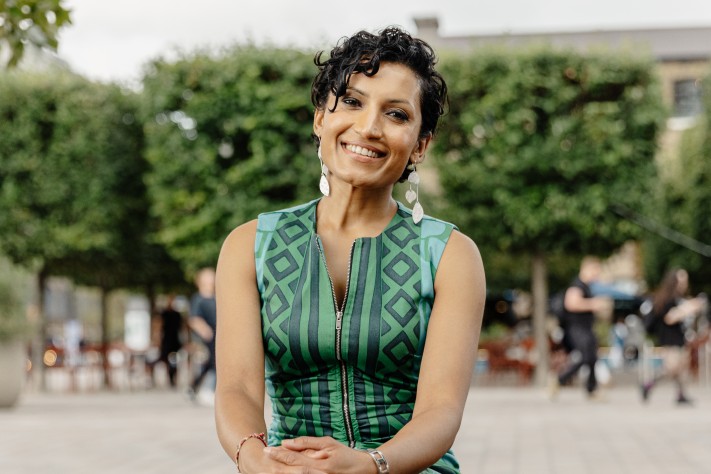8th September 2025
We are delighted to share this Voices blog by Dr Guddi Singh, Paediatrician, Researcher, Broadcaster and Founder of WHAM (Wellbeing and Health Action Movement) as she shares information on her upcoming series for BBC Radio 4 – The Three Ages of Child.

Dr Guddi Singh, Paediatrician, Researcher, Broadcaster and Founder of WHAM
When I began recording The Three Ages of Child for BBC Radio 4, I thought I knew the challenges facing children in Britain. As a paediatrician, I see them every day in my clinic: asthma triggered by damp housing, children turning up hungry, teenagers in crisis. But what I saw on the road shocked me — and made the case for early intervention more starkly than ever.
Scenes from the frontline
In Hartlepool, where I grew up and one of the first stops on the series, I spent time at a baby bank. Mothers queued for essentials: a safe cot, a pram, even nappies and formula. The volunteers told me they receive 150 referrals a week, often from professionals who have nowhere else to turn.
The consequences are measurable. Professor Sir Michael Marmot told me:
“What happened in 2010? We had the onset of austerity. Five years later, our five-year-old children were no longer growing at the same rate. At age five, children in the UK are seven centimetres shorter than in the Netherlands.” [1]
Austerity is written into children’s bodies. At five-years-old, children in Britain are shorter, sicker, and more vulnerable than their peers in countries of comparable wealth.
Later, in Barnstaple, young people spoke of long waits for mental health support, problems worsening while they waited, and schools trying desperately to plug the gaps.
From baby banks to adolescent wards, the arc is clear: these problems start early, and without intervention, we pay the price for a lifetime.
Why early intervention matters
The Three Ages of Child is more than a documentary series. It is an argument for prevention. Health is not made in hospitals but in homes, schools, and communities — and it depends on professionals who can reach families where they are, long before a child arrives in A&E.
This is where health visitors come in. You combine clinical expertise with community knowledge. You see the conditions in which children live, the pressures families face, and the small opportunities for action that can change lives. Cuts to health visiting over the past decade have stripped away one of the most effective means of prevention our health system ever had.
The stories I gathered for this series make it painfully clear: families need trusted professionals who can connect the dots, spot problems early, and stand alongside parents before crises escalate.
Policy and reality
The government’s new NHS strategy promises to shift focus from hospitals to prevention and community-based care. As part of the series, I put these questions directly to a government minister. The rhetoric was encouraging — but encouraging words are not enough.
If this strategy is to mean anything, it must be matched by investment in the very services that deliver prevention where it counts — services like health visiting. Without that, families will keep falling through the cracks, and the cycle of disadvantage will deepen.
A shared mission
Despite the challenges, there are glimmers of hope. I saw adventure playgrounds doubling as food hubs in Tower Hamlets, schools providing wrap-around support, and young people co-designing new approaches to mental health care. Communities are already creating health against the odds. But they cannot do it alone. They need trained, trusted professionals at their side. They need health visitors.
I’m delighted to be giving a keynote at the iHV Leadership Conference at The King’s Fund on 3 December 2025 where I will be speaking about tackling inequalities and how you can use your voice to advocate for babies and children. I look forward to sharing more from the series — and learning from you. Health visitors understand better than anyone that the earliest years set the trajectory for a lifetime. You have been making this case for years.
Alongside this, I’ve been working to galvanise health professionals through WHAM — the Wellbeing and Health Action Movement — a grassroots network dedicated to rethinking health professionalism for the 21st century. If you are interested in joining a wider conversation about how we act on inequality together, join us. I would love to connect you with this work.
My hope is that The Three Ages of Child will help amplify your voices, so policymakers and the public can see what you already know: early intervention is not optional — it is the bedrock of a healthy society.
An invitation
As colleagues and allies in this work, I invite you to listen, share, and join the conversation. The more people tune in, the clearer the signal to the BBC, to policymakers, and to government that child health matters — and that people care.
Listen to The Three Ages of Child:
- On BBC Radio 4, broadcast across three weeks from 29 September at 11am
- Available on BBC Sounds
- Share with everyone you know
- Join me at the iHV Leadership conference – see here for details.
Together, we can ensure these voices are heard — and begin to build the fairer, healthier society our children deserve.
Dr Guddi Singh, Paediatrician, Researcher, Broadcaster and Founder of WHAM
References
- A Neglected Generation: Reversing the Decline in Children’s Health in England — The Food Foundation (2023)






